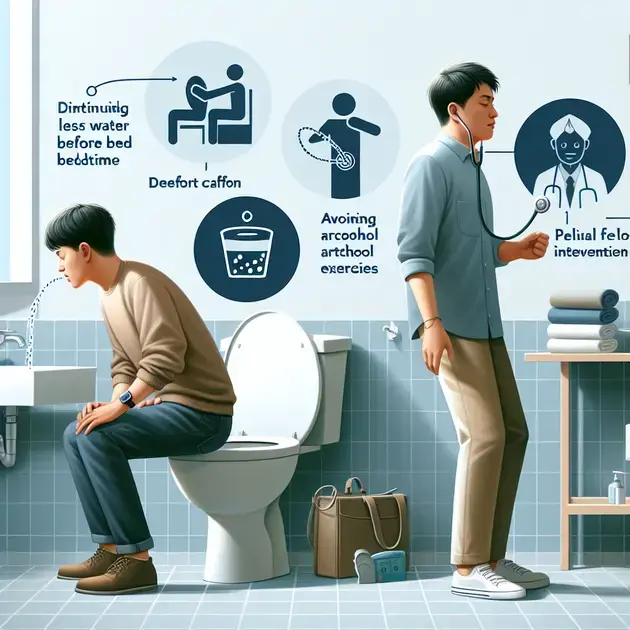Experiencing frequent urination can be both bothersome and concerning for men. It is a common issue that can be caused by various factors, such as urinary tract infections, prostate problems, or even lifestyle habits. Understanding the underlying causes of frequent urination is crucial in order to find appropriate solutions and improve quality of life.
By exploring the potential reasons behind frequent urination in men, individuals can take proactive steps towards managing and treating this condition effectively. From simple lifestyle adjustments to medical interventions, there are multiple strategies that can help alleviate the symptoms and address the root cause of frequent urination. In this blog post, we will delve into the causes of frequent urination in men and discuss practical solutions to promote better urinary health.

**
Causes of Frequent Urination in Men**
1. Prostate Problems
One common cause of frequent urination in men is prostate problems such as an enlarged prostate or prostate cancer. These conditions can put pressure on the urethra, leading to urinary symptoms including frequent urination. To learn more about prostate health and possible conditions, you can visit the Mayo Clinic website at https://www.mayoclinic.org.
2. Urinary Tract Infections
Urinary tract infections (UTIs) can also be a cause of frequent urination in men. Bacteria entering the urinary tract can result in inflammation and irritation, leading to the need to urinate more frequently. For more information on UTIs and how to prevent them, you can check out the Centers for Disease Control and Prevention (CDC) website at https://www.cdc.gov.
3. Diabetes
Diabetes is another potential cause of frequent urination in men. High levels of blood sugar can lead to the body trying to eliminate excess glucose through urine, resulting in increased urination. To learn more about diabetes and its effects on urinary health, visit the American Diabetes Association website at https://www.diabetes.org.
4. Medications
Certain medications, such as diuretics or drugs that treat high blood pressure, can also contribute to frequent urination in men as a side effect. It’s important to consult with a healthcare provider about any medication-related concerns. For detailed information on common medications and their side effects, you can refer to RxList at https://www.rxlist.com.
5. Neurological Conditions
Neurological conditions like multiple sclerosis or stroke can affect nerve signals responsible for bladder control, leading to issues with urinary frequency. Seeking guidance from a neurologist or specialist is recommended for men experiencing these symptoms. For more information on neurological disorders, check out the National Institute of Neurological Disorders and Stroke website at https://www.ninds.nih.gov.
—
**
Exploring Solutions for Frequent Urination**
1. Kegel Exercises
One effective solution for managing frequent urination is practicing Kegel exercises to strengthen the pelvic floor muscles. These exercises can improve bladder control and reduce urinary urgency. You can find detailed instructions on how to perform Kegel exercises on the NHS website at https://www.nhs.uk.
2. Bladder Training
Bladder training techniques can help men gradually increase the time between bathroom visits and improve bladder capacity. This method involves scheduled voiding and gradually extending the time intervals. To learn more about bladder training strategies, visit the Urology Care Foundation website at https://www.urologyhealth.org.
3. Fluid Management
Monitoring fluid intake, especially in the evening, can help reduce instances of nighttime urination. Limiting caffeine and alcohol consumption, which can irritate the bladder, may also be beneficial. For tips on proper fluid management, consult the NHS Choices website at https://www.nhs.uk.
4. Dietary Adjustments
Making dietary modifications like avoiding spicy foods or artificial sweeteners can alleviate symptoms of overactive bladder and reduce urinary frequency. A balanced diet rich in fiber and nutrients can also support overall bladder health. For guidance on bladder-friendly diets, explore resources on Harvard Health Publishing’s website at https://www.health.harvard.edu.
5. Stress Management
Stress and anxiety can exacerbate urinary symptoms, so implementing stress management techniques like meditation or mindfulness can help improve bladder control. Learning relaxation exercises can also benefit men experiencing frequent urination due to stress. The Mayo Clinic offers resources on stress reduction methods at https://www.mayoclinic.org.

**Understanding the Effects of Men’s Frequent Urination**
Understanding the Effects of Men’s Frequent Urination
Introduction
Men’s frequent urination can have various effects on their daily lives and overall health. Understanding the underlying causes and consequences of this issue is crucial for effective management and treatment.
Impact on Quality of Life
Constantly needing to urinate can significantly impact a man’s quality of life. It can lead to disruptions at work, social outings, and even sleep. Men may experience embarrassment, anxiety, and frustration due to their frequent bathroom trips.
Medical Concerns
Frequent urination can sometimes be a symptom of an underlying medical condition such as urinary tract infections, prostate issues, or diabetes. Ignoring these signs can lead to further complications and worsen the overall health of men.
Emotional Well-Being
The emotional toll of frequent urination should not be underestimated. Men may feel self-conscious, stressed, or isolated due to their condition. Seeking support from healthcare professionals and loved ones is essential for maintaining emotional well-being.
Overall Health Implications
Men’s frequent urination can also have implications for their overall health. Chronic inflammation from untreated urinary issues can impact various organs and systems in the body, highlighting the importance of addressing this issue promptly.
Conclusion
Understanding the effects of men’s frequent urination is essential for addressing the challenges and implications associated with this condition. It is not just a matter of inconvenience but can significantly impact a man’s quality of life. The disruptions at work, social situations, and even sleep caused by constant bathroom trips can lead to feelings of embarrassment, anxiety, and frustration.
Moreover, frequent urination can serve as a warning sign of underlying medical concerns such as urinary tract infections, prostate issues, or diabetes. Ignoring these symptoms can exacerbate health complications and deteriorate overall well-being. Therefore, early detection and appropriate management are crucial for maintaining men’s health.
Furthermore, the emotional toll of frequent urination should be acknowledged. Men may struggle with feelings of self-consciousness, stress, and isolation due to this condition. Seeking support from healthcare professionals and loved ones is vital for promoting emotional well-being and navigating the challenges that come with frequent urination.